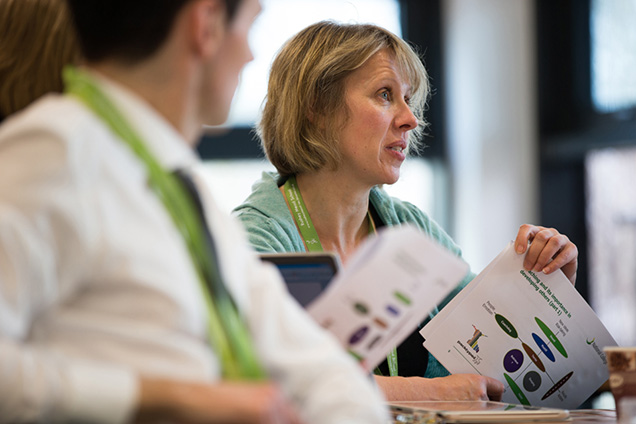There are around 500 national leaders of governance (NLGs), sharing their expertise with other schools. In this article, a chair explains how one helped her school to an improved Ofsted grade and a newly designated NLG talks about his hopes for the role.
Tracy Cattell, chair of governors, credits the improvement in her school’s Ofsted grades to two inspirational contributors, one a national leader of governance.
Following the amalgamation of separate infant and junior schools, the knowledge and experience of our governing body varied enormously. Some had been long-serving governors at the previously separate schools; others, like me, were recruited at the point of amalgamation and came with no prior knowledge of governance to the new primary, which faced multiple challenges.
As well as merging buildings, security and IT systems, two separate staff bodies with highly individual identities had to be united, and a problem of grade inflation at KS1 impacted significantly on the ability to demonstrate the requisite pupil progress at KS2.
Senior leaders rapidly implemented targeted interventions for older children and new strategies for improving the basic skills of younger ones, but none of these measures had results to show when we fell due for inspection. Ofsted descended, and our new school was demoralisingly graded as ‘requires improvement’.
Lack of training
Governance was heavily criticised, yet most of us had had no involvement in the process and didn’t know what we had been doing right or wrong. None of us had up-to-date training.
Our head arranged training, and also provided access to the school improvement consultant who skilfully steered us through the RAISEonline report. However, two of the most unlikely sources of support – because both had filled us with dread – ultimately had immense impact on our improvement and helped us to turn ourselves around.
The first was an Ofsted inspector (HMI). As a ‘requires improvement’ school we were subject to monitoring inspections, but by this time we had developed our practice as a result of our training, and assessment results had come in which reflected improving standards in both key stages as a result of the leadership decisions taken at the point of amalgamation, which the report recognised.
Crucially, HMI also advised that amalgamations are often divisive processes with the usual outcome of ‘special measures’, and that our head had achieved a remarkable success in avoiding this, uniting two disparate schools, correctly identifying what needed to be done, and driving up standards. This gave our governing body the confidence to fully support the school and, armed with up-to-date knowledge from our training and national case studies published by Ofsted, our school and governing body were in a position to work together to move the school forward.
Review of governance
The second was our review of governance, led by Lorne Pearcey, chair of a primary level federated governing body and a national leader of governance. I had been chair for three weeks when it took place, and envisaged another inspection involving judging and pigeon-holing. Nothing could have been further from the truth: the process was overwhelmingly supportive, and Lorne was fundamental in focusing our improvement into practical steps through which we could develop and evidence improving governance.
The greatest advantage was shared practice: Lorne shared templates for school and governor reporting, and explained why they were effective. Her insights energised and refocused our governing body: she engaged with our particular circumstances and the development of our individual members, and was a boundless source of encouragement.
This input was critical in enabling us to develop into effective participants in the strategic leadership of our school, and her ongoing willingness to support meant that I, as a fairly inexperienced governor and a brand new chair, effectively gained a mentor as I found my feet in my new role.
Two years to the day since our previous inspection, Ofsted arrived again. This time, five of us met the inspection team; we felt prepared, confident in our school’s improvement and our own, and were armed with evidence presented in a way which we knew demonstrated the things Ofsted would need to check. Our school was graded ‘good’ in every aspect, and governance received a highly positive evaluation. The experienced and focused support of our NLG was instrumental in our achievement of this outcome and I would unhesitatingly recommend consulting one.
This article was first published in the National Governors' Association's (NGA) Governing Matters, a publication available only to members of the NGA. The NGA is an independent charity representing and supporting governors, trustees and clerks in maintained schools and academies in England. To find out more about the NGA, its services and membership, please visit the NGA website.
A new national leader
Mark Blois is a newly designated national leader of governance and the head of education at Browne Jacobson LLP. He describes what he's expecting from the role.
"I became a national leader of governance in the summer of 2015.
"In my capacity as chair of a large and fast-growing multi-academy trust over the last four years and professionally as an education lawyer for over fifteen years, I am acutely aware of how rapidly the education sector landscape is changing. This can sometimes be confusing and disorientating for those involved in the governance of education providers. Yet the need for governors to be well informed and highly skilled is presently greater than ever. Against this background I was attracted by the idea of working with governing bodies nationally and supporting them with a wide range of challenges and opportunities.
"I know that being a governor, in particular a chair, can sometimes be a lonely place and I anticipate my work as an NLG can make a contribution through supporting, challenging and coaching governing bodies so that they are able to confidently and proactively take control of their own destiny.
"I am particularly looking forward to working with governor colleagues who are considering developing and evolving their governance structure to meet the challenges of the new educational landscape, perhaps through formal collaborations with other schools and academies. I believe this will be one of the key strategic issues for governing bodies over the next five years, and that this agenda will be critical if our schools are to remain fit for the future.
"Equally, one of the great pleasures of working in the education sector is the vibrant and never ending potential to learn from others’ good practice and I am sure I will benefit a great deal as a governor myself from relationships developed through my work as an NLG."
You can follow mark on Twitter at @MarkBlois.
If you have any questions or feedback, please comment below. To keep up to date with this blog, you can sign up for email updates or follow NCTL on Twitter.
You can read more about national leaders of governance here. For more information or opportunities to get involved with our work, visit our pages on GOV.UK.


Leave a comment